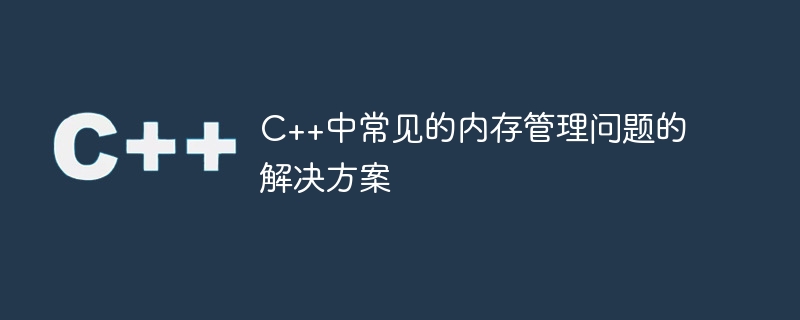

Solutions to common memory management problems in C
Introduction:
In the C language, memory management is a very important and common problem. Since C has no automatic memory management mechanism, developers are responsible for manually allocating and freeing memory. However, this often leads to problems such as memory leaks, memory overflows, and wild pointers. This article will introduce some common memory management problems and provide corresponding solutions and specific code examples.
1. Memory Leak
Memory leak means that a part of the allocated memory space in the program has not been released for some reason, causing the system's available memory to continue to decrease, thus causing the problem of memory exhaustion. The following are some common memory leaks and solutions:
1. Forget to release heap memory
Common example codes are as follows:
void func() {
int* p = new int;
// 其他操作
return; // 可能会导致内存泄漏
}Solution: Manually before the function exits Free up memory.
void func() {
int* p = new int;
// 其他操作
delete p; // 释放内存
return;
}2. Allocate memory in a loop and forget to release it
Common example codes are as follows:
void func() {
while (true) {
int* p = new int;
// 其他操作
}
return; // 可能会导致内存泄漏
}Solution: Manually release the memory in the loop body.
void func() {
while (true) {
int* p = new int;
// 其他操作
delete p; // 释放内存
}
return;
}2. Memory overflow
Memory overflow means that the memory space that needs to be allocated during the running of the program exceeds the maximum memory capacity that the system can provide, causing the program to crash or terminate abnormally. The following are some common memory overflow situations and solutions:
1. Array out-of-bounds access
Common example codes are as follows:
int arr[10];
for (int i = 0; i < 20; i++) {
arr[i] = i; // 可能会导致内存溢出
}Solution: Ensure that the array subscript does not go out of bounds.
int arr[10];
for (int i = 0; i < 10; i++) {
arr[i] = i;
}2. Recursive calls lead to stack overflow
Common example codes are as follows:
void recursiveFunc() {
recursiveFunc(); // 可能会导致栈溢出
}Solution: Avoid infinite recursion by adjusting recursion conditions or optimizing algorithms.
void recursiveFunc(int n) {
if (n <= 0) {
return;
}
recursiveFunc(n - 1);
}3. Wild pointers
Wild pointers refer to pointers that point to freed or unallocated valid memory space. Operating on wild pointers may cause memory access errors, program crashes and other problems. The following are some common wild pointer situations and solutions:
1. The null pointer is not set after release
Common example codes are as follows:
int* p = new int; delete p; // 其他操作 *p = 10; // 可能会导致内存访问错误
Solution: After releasing the memory , set the pointer to empty.
int* p = new int; delete p; p = nullptr;
2. Uninitialized pointer
Common example codes are as follows:
int* p; *p = 10; // 可能会导致内存访问错误
Solution: Initialize the pointer before using it.
int* p = nullptr; p = new int; *p = 10;
Conclusion:
This article introduces common memory management problems and solutions in C. By avoiding memory leaks, memory overflows, and wild pointer problems, program performance and stability can be improved. In actual programming, developers should pay attention to allocating and releasing memory reasonably and develop good coding habits to ensure the normal operation of the program.
Note: The above code examples are for reference only. In actual applications, they need to be flexibly adjusted and implemented according to specific scenarios.
The above is the detailed content of Solutions to common memory management problems in C++. For more information, please follow other related articles on the PHP Chinese website!
 What are the differences between c++ and c language
What are the differences between c++ and c language
 Recommended learning order for c++ and python
Recommended learning order for c++ and python
 Cost-effectiveness analysis of learning python and c++
Cost-effectiveness analysis of learning python and c++
 Is c language the same as c++?
Is c language the same as c++?
 Which is better to learn first, c language or c++?
Which is better to learn first, c language or c++?
 The difference and connection between c language and c++
The difference and connection between c language and c++
 C++ software Chinese change tutorial
C++ software Chinese change tutorial
 Cost-effectiveness analysis of learning python, java and c++
Cost-effectiveness analysis of learning python, java and c++




